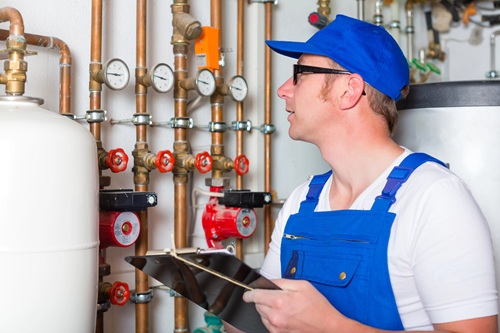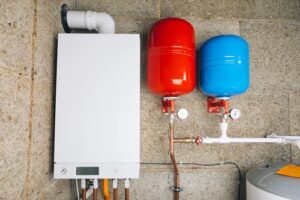
When choosing the best way to keep your home comfortable, many homeowners debate between a heat pump and a gas furnace. Each heating system has unique advantages, but there are also plenty of misconceptions about how they perform. Understanding these differences can help you make an informed decision and select the most efficient and cost-effective solution for your home.
At Smith Heating and Air Conditioning, LLC, our expert HVAC contractors are here to help you navigate the pros and cons of each option and determine what best fits your climate, home, and budget. Let’s separate fact from fiction with these eight common myths about heat pumps and gas furnaces.
- What Is a Heat Pump?
- What Is a Gas Furnace?
- Myth #1 – A Gas Furnace Is Always Better
- Myth #2 – A Heat Pump Is the Same as an Air Conditioner
- Myth #3 – Heat Pumps Don’t Provide Enough Heat
- Myth #4 – Gas Furnaces Are Always More Efficient
- Myth #5 – A Gas Furnace Costs Less
- Myth #6 – There’s Only One Type
- Myth #7 – Both Systems Produce Carbon Monoxide
- Myth #8 – Gas Furnaces Produce Better Heat
- Choosing the Right Heating System for Your Home
What Is a Heat Pump?
A heat pump is a versatile, energy-efficient system that provides both heating and cooling. In the summer, it acts like an air conditioner by transferring warm air from inside your home to the outdoors. During winter, it reverses the process—extracting heat from the outside air and moving it indoors.
Unlike gas furnaces, heat pumps don’t burn fuel to create warmth. Instead, they use refrigerant and electricity, making them an environmentally friendly and energy-saving option for homes in moderate climates.
What Is a Gas Furnace?
A gas furnace uses natural gas combustion to create heat, which is then distributed throughout your home via ducts. These systems are known for producing intense heat, ideal for very cold regions. However, they require proper ventilation and maintenance to ensure safety and efficiency.
Myth #1 – A Gas Furnace Is Always Better
This is one of the biggest misconceptions. While gas furnaces are powerful, they’re not always the best solution. Homes without natural gas lines can’t use a gas furnace, and installation costs can be high.
In milder climates like the southern U.S., a heat pump often outperforms a furnace in efficiency and comfort. Many homeowners also choose dual-fuel systems that combine both—using the heat pump in mild weather and the furnace when temperatures drop below freezing.
Myth #2 – A Heat Pump Is the Same as an Air Conditioner
Although a heat pump works similarly to an air conditioner in cooling mode, it can also heat your home by reversing the refrigerant flow. This flexibility allows one system to handle year-round comfort—something an air conditioner alone cannot do.
Myth #3 – Heat Pumps Don’t Provide Enough Heat
This myth is outdated. Modern heat pumps are built to perform efficiently even in cold temperatures. Advanced models can heat homes effectively in conditions as low as 0°F. For extreme climates, a dual-fuel setup ensures consistent comfort and efficiency.
Myth #4 – Gas Furnaces Are Always More Efficient
Not necessarily. While natural gas can be cheaper than electricity, a heat pump can still be more cost-effective in areas with moderate winter temperatures. Since it transfers heat instead of generating it, a heat pump can deliver up to three times more energy than it consumes.
Myth #5 – A Gas Furnace Costs Less
The initial installation of a gas furnace might be cheaper, but if your home doesn’t already have gas lines, installation costs rise significantly. Meanwhile, heat pumps qualify for federal tax credits—up to 30% or $2,000—through the Inflation Reduction Act, making them an appealing long-term investment.
Myth #6 – There’s Only One Type

heat pump
There are three main types:
- Air-source – the most common, ideal for most homes.
- Ductless mini-split – perfect for homes without ductwork or for zoned heating.
- Geothermal – use underground temperatures for maximum efficiency.
Each option provides reliable heating services tailored to your home’s layout and comfort needs.
Myth #7 – Both Systems Produce Carbon Monoxide
Only gas furnaces can emit carbon monoxide because they use combustion to create heat. Proper installation and annual maintenance from a professional HVAC contractor ensure safe operation. Heat pumps, on the other hand, don’t use combustion and therefore pose no risk of carbon monoxide poisoning.
Myth #8 – Gas Furnaces Produce Better Heat
While gas furnaces create hotter air, that doesn’t always mean better comfort. In mild climates, a heat pump provides steady, even heat without overheating your home or drying the air. Using a furnace where it’s not needed can waste energy and increase utility bills.
Choosing the Right Heating System for Your Home
The ideal system depends on your region, budget, and home design. For homeowners in moderate climates, a heat pump offers excellent year-round comfort and efficiency. For colder regions, a gas furnace or dual-fuel system may be best.
At Smith Heating and Air Conditioning, LLC, we offer expert heating services to help you choose, install, and maintain the perfect system for your home’s needs.
Ready to upgrade your home comfort? Contact Smith Heating and Air Conditioning, LLC today to schedule a consultation with an experienced HVAC contractor. We’ll help you decide whether a heat pump or a gas furnace is right for your home—and ensure it’s installed for peak performance and efficiency.
Smith Heating and Air Conditioning, LLC
3416 Zion Ln
Knoxville, TN 37931
865-364-6479
https://smithheatandair.com/



No comments:
Post a Comment